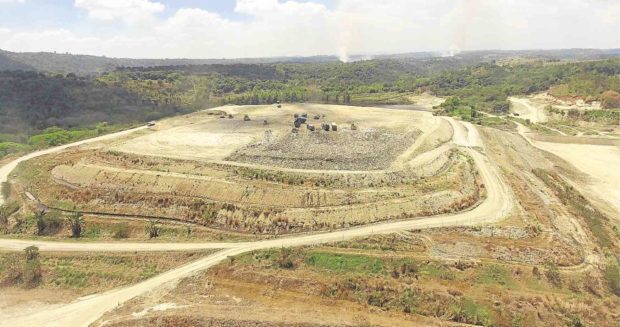
FIRST IN PH This 100-hectare engineered landfill in Tarlac province would soon also churn out electricity once a “critical mass” is reached in the volume of waste that is dumped in it. —CONTRIBUTED PHOTO
CAPAS, Tarlac — The amount of garbage being dumped at what could be the country’s only engineered landfill in Tarlac province was likely to reach “critical mass” in two to three years that would allow its conversion into electricity, according to the landfill’s operator.
Private company Metro Clark Waste Management Corp. (MCWMC) said an average of 664.86 cubic meters (1,600 tons) of trash from 90 local governments in central and northern Luzon use the engineered landfill and more garbage was expected from other communities.
Rufo Colayco, MCWMC president and chief executive officer, said the additional volume of trash would make a waste-to-energy project viable in the landfill.
Next step
Colayco said regulatory requirements for developing the waste-to-energy project, like that on pricing, were now being discussed with the Department of Environment and Natural Resources and the Energy Regulatory Commission.
At least 70 hectares of the landfill were expected to be filled in 10 years. Another 30 ha serve as buffer zones.
“The next step is to proceed with the waste-to-energy project,” which would be fueled by solid waste that have accumulated in the landfill since 2002, said Holger Holts, MCWMC technical chief.
Tarlac City was the first paying local government served by the waste facility, which had been touted as the country’s first engineered sanitary landfill.
The landfill is within the government-owned Clark Special Economic Zone, where 9,500 ha were being developed as the Clark Green City.
The area used to host military base lands leased to the United States until 1991, when the Senate rejected the extension of the bases agreement.
Canadian trash
MCWMC had invested P500 million in the facility which is co-owned by German conglomerates BN Ingenieure GmbH and Heers & Brockstedt Umwelttechnik GmBH. Its lease contract with the state-owned Clark Development Corp. is due for renewal in 2025.
In 2015, the landfill was in the news when a Manila court ordered the Bureau of Customs to throw illegally imported Canadian waste at the facility.
The provincial government prohibited the MCWMC from accepting foreign waste.
Despite the ban outlined in Republic Act No. 9003, or the Ecological Solid Waste Management Act of 2000, 306 local governments still operate open dumps as of the last quarter of 2017, the Environmental Management Bureau (EMB) said in a report it posted on its website.
The Office of the Ombudsman has filed cases against erring local governments.
At least 130 sanitary landfills exist as of 2017, the EMB said in a separate report.
Colayco said more engineered sanitary landfills have to be built “to protect the environment.” —Tonette Orejas

